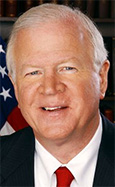Ag committee negotiations at a standstill
December 13, 2012 | 06:33 PM
Negotiations between the Senate and House agriculture committees ground to a halt today, as the Senate Agriculture Committee met in closed session, Chairman Debbie Stabenow said the Senate had made the best offer it could, and House Agriculture Committee leaders accused the senators of bad faith in the negotiations.

Sen. Debbie Stabenow, D-Mich.
Stabenow, D-Mich., also said that the situation is “very difficult” because House Speaker John Boehner, R-Ohio, has not signaled whether he wants to include the farm bill in a “fiscal cliff” bill or not.
Stabenow said she has “no confidence” that the speaker is backing up House Agriculture Committee Chairman Frank Lucas, R-Okla. “There has to be leadership in the House to care about rural America and to back up their leaders,” she said.
Meanwhile, Agriculture Secretary Tom Vilsack told reporters that the House and Senate should finish the bill because negotiators on the fiscal cliff legislation will not wait for them if they reach agreement on a larger bill to deal with taxes, the budget deficit and entitlements. (See following story.)
Leaders of the House and Senate agriculture committees are in disagreement over the commodity title of the farm bill.
The Senate-passed farm bill includes an Agricultural Risk Coverage program that would pay farmers for “shallow losses” that crop insurance would not cover. That program is favored by corn and soybean producers and smaller crops.
The House Agriculture Committee-passed bill includes a shallow loss program, but offers farmers a Price Loss Program that would pay farmers if prices fell below certain target levels and raises target prices from current levels. Rice and peanut growers favor the House approach, while wheat growers are split over which approach is best.
The Senate has made an offer to the House that would allow for a target-price based program and would raise the baseline spending for rice, peanuts and wheat.
Emerging at 11:45 a.m. from a closed-door meeting with 12 members of her committee, Stabenow called the meeting “very positive,” saying members of the committee had expressed unity behind what the Senate has offered the House.
She said the House needs to acknowledge that the Senate has passed a farm bill while the House bill has only gone through the House Agriculture Committee.
“We have passed a bill through the entire body,” Stabenow said. “They haven’t passed it through the House.”
The offer to which Stabenow referred was to increase baseline spending for rice, peanuts and wheat to 75 percent of the difference between the House and Senate baselines for those crops.
“That’s as far as we can go without some pretty serious discussion,” Stabenow said, adding that she would communicate that message to Lucas and House Agriculture ranking member Collin Peterson, D-Minn., today.
Stabenow, noting that the House had made a return offer but that it was unacceptable to her committee members, said there is “only so far I can go without losing the support of my members.”
“There is a philosophical difference” between the House and Senate committees, Stabenow noted. But she also said, “I don’t think we are that far apart. There are only a few differences, but they are significant.”

Rep. Frank Lucas, R-Okla.
Lucas and Peterson issued a joint statement at 1 p.m.
“When the Senate Ag Committee starts to negotiate in good faith with their House counterparts rather than through the press, we stand ready to work with them,” the statement said.
“Contrary to what they would have you believe, this is not a rice, peanut, and wheat issue. Rather, it's about making sure policy is defensible to taxpayers and works for all commodities in all regions of the country. Having made a reasonable offer, we continue to wait for a balanced offer from the Senate so we can sort out the details.”
Although the issue of the commodity title has been portrayed as a conflict between the North and the South, senators from both regions backed Stabenow as they emerged from the meeting.

Sen. Kent Conrad, D-N.D.
Senate Budget Committee Chairman Kent Conrad, D-N.D., said that what the House Agriculture Committee had offered is “basically their House committee bill.” To ask the Senate to accede to the House committee on a bill that has not passed the House is “not responsible,” he said.
Asked whether he believes he will have an opportunity to use a source of funds that he had identified for the farm bill but was not willing to reveal earlier this year, Conrad only smiled.
Conrad, whose knowledge of the federal budget was important in the development of the 2008 farm bill and who has also been a player in the Senate development of the 2012 bill, will retire when this Congress leaves at the end of the year.
Sen. Amy Klobuchar, D-Minn., signaled she hopes the committee leaders will reach agreement and that the farm bill is within the fiscal cliff deal.
“We’d rather be at the table than be someone’s lunch,” Klobuchar said.
Sen. Mike Johanns, R-Neb., a former Agriculture secretary, said that the senators had not been asked to sign off on a compromise bill. “We’re not there yet,” he said.
Sen. Charles Grassley, R-Iowa, said, “We are pretty united in a bipartisan way. The House has not come very far for a compromise.”
Senate Agriculture ranking member Pat Roberts, R-Kan., said that the meeting had been “productive,” but when asked about Grassley’s view that the committee is unified, he said that was Grassley’s view.

Sen. Saxby Chambliss, R-Ga.
Sen. Saxby Chambliss, R-Ga., who voted against the Senate bill because he did not believe it treated southern crops fairly, said today he believes there has been a “genuine” effort on both sides. He added that Lucas and Peterson “have legitimate concerns,” but said he thinks both the House and Senate leaders “are working toward common ground.”
Asked whether he thought Congress will finish the farm bill or reach a deal on the fiscal cliff, Chambliss said he didn’t know.
“There are lots of balls in the air,” Chambliss said. “I’ve never seen a year-end like this year-end.”

Sen. Debbie Stabenow, D-Mich.
Stabenow, D-Mich., also said that the situation is “very difficult” because House Speaker John Boehner, R-Ohio, has not signaled whether he wants to include the farm bill in a “fiscal cliff” bill or not.
Stabenow said she has “no confidence” that the speaker is backing up House Agriculture Committee Chairman Frank Lucas, R-Okla. “There has to be leadership in the House to care about rural America and to back up their leaders,” she said.
Meanwhile, Agriculture Secretary Tom Vilsack told reporters that the House and Senate should finish the bill because negotiators on the fiscal cliff legislation will not wait for them if they reach agreement on a larger bill to deal with taxes, the budget deficit and entitlements. (See following story.)
Leaders of the House and Senate agriculture committees are in disagreement over the commodity title of the farm bill.
The Senate-passed farm bill includes an Agricultural Risk Coverage program that would pay farmers for “shallow losses” that crop insurance would not cover. That program is favored by corn and soybean producers and smaller crops.
The House Agriculture Committee-passed bill includes a shallow loss program, but offers farmers a Price Loss Program that would pay farmers if prices fell below certain target levels and raises target prices from current levels. Rice and peanut growers favor the House approach, while wheat growers are split over which approach is best.
The Senate has made an offer to the House that would allow for a target-price based program and would raise the baseline spending for rice, peanuts and wheat.
Emerging at 11:45 a.m. from a closed-door meeting with 12 members of her committee, Stabenow called the meeting “very positive,” saying members of the committee had expressed unity behind what the Senate has offered the House.
She said the House needs to acknowledge that the Senate has passed a farm bill while the House bill has only gone through the House Agriculture Committee.
“We have passed a bill through the entire body,” Stabenow said. “They haven’t passed it through the House.”
The offer to which Stabenow referred was to increase baseline spending for rice, peanuts and wheat to 75 percent of the difference between the House and Senate baselines for those crops.
“That’s as far as we can go without some pretty serious discussion,” Stabenow said, adding that she would communicate that message to Lucas and House Agriculture ranking member Collin Peterson, D-Minn., today.
Stabenow, noting that the House had made a return offer but that it was unacceptable to her committee members, said there is “only so far I can go without losing the support of my members.”
“There is a philosophical difference” between the House and Senate committees, Stabenow noted. But she also said, “I don’t think we are that far apart. There are only a few differences, but they are significant.”

Rep. Frank Lucas, R-Okla.
Lucas and Peterson issued a joint statement at 1 p.m.
“When the Senate Ag Committee starts to negotiate in good faith with their House counterparts rather than through the press, we stand ready to work with them,” the statement said.
“Contrary to what they would have you believe, this is not a rice, peanut, and wheat issue. Rather, it's about making sure policy is defensible to taxpayers and works for all commodities in all regions of the country. Having made a reasonable offer, we continue to wait for a balanced offer from the Senate so we can sort out the details.”
Although the issue of the commodity title has been portrayed as a conflict between the North and the South, senators from both regions backed Stabenow as they emerged from the meeting.

Sen. Kent Conrad, D-N.D.
Senate Budget Committee Chairman Kent Conrad, D-N.D., said that what the House Agriculture Committee had offered is “basically their House committee bill.” To ask the Senate to accede to the House committee on a bill that has not passed the House is “not responsible,” he said.
Asked whether he believes he will have an opportunity to use a source of funds that he had identified for the farm bill but was not willing to reveal earlier this year, Conrad only smiled.
Conrad, whose knowledge of the federal budget was important in the development of the 2008 farm bill and who has also been a player in the Senate development of the 2012 bill, will retire when this Congress leaves at the end of the year.
Sen. Amy Klobuchar, D-Minn., signaled she hopes the committee leaders will reach agreement and that the farm bill is within the fiscal cliff deal.
“We’d rather be at the table than be someone’s lunch,” Klobuchar said.
Sen. Mike Johanns, R-Neb., a former Agriculture secretary, said that the senators had not been asked to sign off on a compromise bill. “We’re not there yet,” he said.
Sen. Charles Grassley, R-Iowa, said, “We are pretty united in a bipartisan way. The House has not come very far for a compromise.”
Senate Agriculture ranking member Pat Roberts, R-Kan., said that the meeting had been “productive,” but when asked about Grassley’s view that the committee is unified, he said that was Grassley’s view.

Sen. Saxby Chambliss, R-Ga.
Sen. Saxby Chambliss, R-Ga., who voted against the Senate bill because he did not believe it treated southern crops fairly, said today he believes there has been a “genuine” effort on both sides. He added that Lucas and Peterson “have legitimate concerns,” but said he thinks both the House and Senate leaders “are working toward common ground.”
Asked whether he thought Congress will finish the farm bill or reach a deal on the fiscal cliff, Chambliss said he didn’t know.
“There are lots of balls in the air,” Chambliss said. “I’ve never seen a year-end like this year-end.”